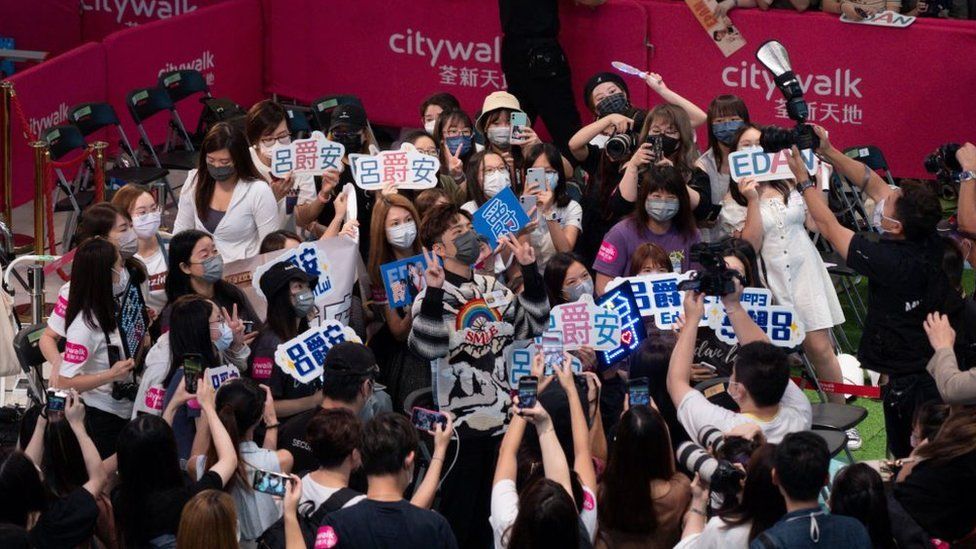Cantopop: Why Hong Kong is seeking solace in local music
- Published

Life in Hong Kong has been reshaped as Beijing has increasingly tightened its grip over almost every aspect of life in the city. But Cantopop remains a venue for those in the city to seek solace and express their collective identity, as the BBC's Grace Tsoi writes.
It was an accident that shocked much of Hong Kong: a giant screen fell and injured two dancers during a concert by hugely popular boy band Mirror.
But the collective outpouring of emotion was also caused by what Mirror had come to represent - a rare source of joy for many in the city after years of political upheaval.
Mirror is widely credited for reviving Cantopop - music sung in Cantonese, the main language used in Hong Kong and an integral part to the city's cultural identity. Most of mainland China communicates in Mandarin.
The music form's appeal had previously been dwindling.
"Cantopop was formulaic, just like canned food," says Jeng Lau, a marketing professional in her 30s who found herself turning to Taiwanese and Japanese bands instead.
Hong Kong is a former British colony and is meant to enjoy certain rights, like freedom of assembly and freedom of speech, that are not available in mainland China.
But in 2019, plans to pass an extradition law sparked fears that Beijing was increasing its control. People came out onto the streets and there were months of anti-government protests.
Beijing then introduced a sweeping national security law (NSL), which critics say reduces the city's judicial autonomy and makes it easier to punish activists.
About 200 people have since been arrested under the NSL alone, including pro-democracy lawmakers.
On the surface, it may seem like this once-rebellious city has now fallen silent - but fans say the one thing they can still cling on to is Cantopop.
"Life in Hong Kong is depressing. Your friends and family are leaving and every day we seem to lose abstract things like [our] freedom," said Jane Chan, a 28-year-old in the education sector.
"So it's so precious for us to witness [a band like] Mirror, something that is local and tangible, that can still grow and thrive [during these times]."
A golden age
Cantopop has always been integral to the distinctive Hong Kong identity, which started to form during the former British colony's economic rise in the 1970s.
The 1980s and 1990s were the golden age of Hong Kong pop culture. Cantopop was an important cultural export, winning fans in mainland China, Taiwan and Southeast Asia.
But from the 2000s, the Cantopop market slowly shrank, with many Hong Kong artists focusing their careers on the mainland market and fans turning to Mandopop and K-pop.
That decline has now reversed.
"Pop culture has become a site of preservation for people to reminisce about what Hong Kong people miss," said cultural commentator Chiu Wan.
"For example, a song about bidding farewell to an ex-lover can be understood as dedicated to friends who moved abroad or even a hometown that people are no longer familiar with."
Data from KKBOX, one of the most popular music streaming platforms in the city, found that Hong Kong users spent 25% more time streaming Cantopop in 2021 compared to 2020. Eight of the 10 most played songs last year on the platform were related to Mirror.
Ms Lau is one of the many people whose interest in Cantopop has been reignited.
"We can see how the regime is suppressing the Hong Kong identity, and we want to protect it," said Ms Lau.
"Cantonese is very important to us, and Cantopop plays an important role in safeguarding Cantonese."
Mired in uncertainty
Mirror formed out of a reality show in 2018 and quickly shot to fame.
The trend is not all one-way, though.
Many of the city's older stars have shifted their focus to the mainland market - performing in New Year's Eve shows held by regional TV channels - under the name of singers from the Greater Bay Area, a government plan to integrate Hong Kong into the mainland's Guangdong province..
With its population of 1.3 billion, it's not hard to figure out what attracts pop stars to the Chinese mainland. However, it also comes with certain conditions.
Jackson Wang, for example, was born in Hong Kong and used to carry a Hong Kong flag and wear a hat with the city's symbol. But he later switched to carrying a Chinese flag on his concert tour.
There is also criticism of how Hong Kong's music industry operates, with the injury to Mirror's dancers highlighting questionable safety standards.
It is now unclear if the band might stay as popular, or when they might perform again. Their fate is mired in uncertainty - much like the city itself.
"The Mirror fever, to a large extent, is a healing project, but now it has become another trauma. No one could have guessed it," said Ms Chiu.
But Cantopop remains a free channel of expression for now - despite occasional criticism from officials that culture and art are still being used in "soft resistance".
"Hong Kongers are very creative. They will use more subtle ways if authorities do not allow more explicit expressions," said Ms Lau.
The names of fans have been altered to protect their identities.
Related Topics
- Published6 October 2016
- Published29 June 2017
- Published20 June 2021
- Published21 May 2020